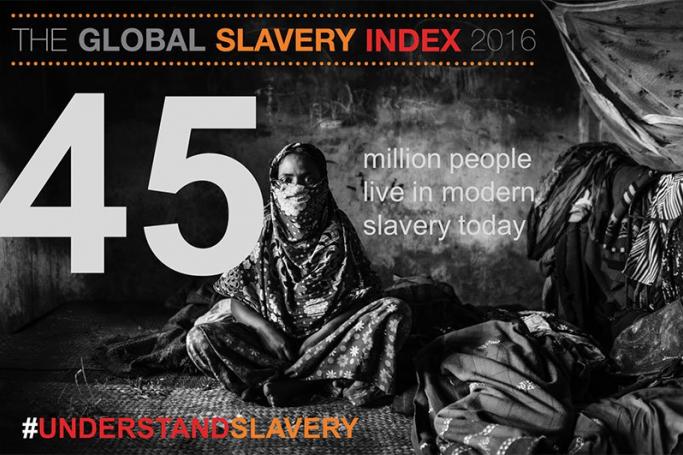An estimated 45.8 million men, women and children around the world are today trapped in modern slavery - 28% more than previously estimated. They are enslaved through human trafficking, forced labour, debt bondage, forced or servile marriage or commercial sexual exploitation. This is revealed in the 2016 Global Slavery Index, the flagship research report published today by the Walk Free Foundation.
In terms of absolute numbers, Asian countries hold the top five positions for highest number of people trapped in slavery, accounting for almost 58% of the world’s enslaved, or 26.6 million people. India remains top of the list with an estimated 18.35 million enslaved people, followed by China (3.39m), Pakistan (2.13m), Bangladesh (1.53) and Uzbekistan (1.23m).
North Korea is the country with the greatest prevalence of modern slavery, with 4.37% of its population estimated to be enslaved. It is also the country with the weakest government response in terms of actions taken to combat modern slavery. The next highest prevalence of slavery is found in Uzbekistan (3.97%), followed by Cambodia, which has a prevalence of 1.65% of their population trapped in slavery.
The 2016 Global Slavery Index estimates that 28% more people are enslaved than reported in the 2014 edition. This significant increase is due to enhanced data collection and research methodology. Survey research for the 2016 Global Slavery Index included over 42,000 interviews conducted in 53 languages across 25 countries, including 15 state-level surveys in India. These representative surveys cover 44% of the global population.
Government response
The Global Slavery Index also tracks government actions and responses to modern slavery. Of the 161 assessed2, 124 countries have criminalised human trafficking in line with the UN Trafficking Protocol and 96 have developed national action plans to coordinate government response. The governments leading the charge against modern slavery are The Netherlands, the United States of America, the United Kingdom, Sweden, Australia, Portugal, Croatia, Spain, Belgium and Norway.
Some significant progress has been made by many governments since the publication of the 2014 report. In 2015, of the 25 countries within the Asia-Pacific region, 24 have laws that criminalise some forms of modern slavery. North Korea remains the only nation in Asia – and the world – that has not explicitly criminalised any form of modern slavery. Australia, New Zealand and the Philippines have the strongest government responses to modern slavery. As in all regions of the world, corruption and official complicity continue to undermine responses in parts of Asia.
Countries such as Croatia, Montenegro, Brazil, Macedonia, the Philippines, Georgia, Moldova, Albania and Jamaica are taking positive steps to respond to modern slavery relative to their wealth.
While India has more people enslaved than any other country, it has made significant progress in introducing measures to tackle the problem. It has criminalised trafficking, slavery, forced labour, child prostitution and forced marriage. The Indian government is currently tightening legislation against human trafficking, with tougher punishment for repeat offenders. It will offer victims protection and recovery support.
Call to action
Mr Andrew Forrest, Chairman and Founder of Walk Free Foundation, said eradicating slavery makes sense, morally, politically, logically and economically, and called on the governments of the world’s leading economies to provide an example to others by enacting and implementing robust anti-slavery measures.
“We call on governments of the top 10 economies of the world to enact laws, at least as strong as the UK Modern Slavery Act 2015, with a budget and capability to ensure organisations are held to account for modern slavery in their supply chains, and to empower independent oversight. Leaders of the world’s major economies must bring the power of business to this issue, by requiring a focus on supply chain transparency.”
“I believe in the critical role of leaders in government, business and civil society,” Mr Forrest said. “Through our responsible use of power, strength of conviction, determination and collective will, we all can lead the world to end slavery.”
Mr Forrest emphasised the key role that business needs to play in eradicating slavery: “Businesses that don’t actively look for forced labour within their supply chains are standing on a burning platform. Business leaders who refuse to look into the realities of their own supply chains are misguided and irresponsible.”
An estimated 45.8 million men, women and children trapped in modern slavery – Report
31 May 2016
An estimated 45.8 million men, women and children trapped in modern slavery – Report












